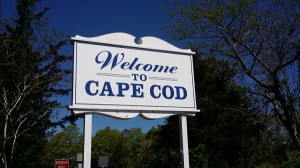
CCB MEDIA PHOTO
The sign at the Cape Cod Chamber of Commerce welcomes visitors.
BARNSTABLE – Representatives of Cape Cod’s tourism industry are debating the effect that tax increases on services like Airbnb would have on the region’s economy.
Cape Cod Chamber of Commerce CEO Wendy Northcross said officials have been shaping thoughts and discussing room sharing services.
“The hotel industry and B-n-B’s with more than three rooms certainly have been telling us they feel there is an uneven playing field,” Northcross said.”
Northcross said tourism officials thought, up until this year, that Airbnb was just bringing more and more people to the Cape.
“We are starting to see more cracks in that veneer now,” she said. “We’re starting to see that shift in housing being consumed for overnight guests and the volume of that is so much greater than any year prior.”
In the state of Massachusetts someone staying in a hotel, motel or bed and breakfast for more than $15 per day there is a state tax of 5.7 percent. Local communities have the option of adding another 6 percent tax.
Taxes are also added for convention centers and in the city of Boston.
“That’s a pretty hefty tax,” Northcross said. “In some cases it can be up to 15 or 16 percent tax.”
Days after saying services like Airbnb should pay the same tax rates as hotels and motels, Governor Charlie Baker is backing off his support of the plan.
Baker said he still supports a level playing field, but the proposal conflicts with his no-new-taxes goals.
Northcross said that more than 58,000 of the roughly 160,000 housing units on Cape Cod are second homes and could be potential competition for hotels, motels and bed and breakfasts.
Northcross said second homes have been rented out for generations but the usual stay is longer than that of a hotel or motel.
“The average length of stay in a rented home is five nights and the average length of stay in a hotel, motel or b-n-b is 2.6 nights,” she said.
The Cape has seen a decline this July in hotel occupancy rates.
“Bridge traffic is similar and there are other things that are pacing the same as prior years so maybe they are staying in Airbnb, we’re not sure, but it’s definitely something to look at.”
Room sharing services are also having an impact on seasonal workers on Cape Cod. Students who come over here on a cultural exchange from foreign countries or college students who come to the Cape for summer jobs are having housing issues, according to Northcross.
“They’ve been squeezed out of places to stay because the homeowner has said ‘I’m going to put it out for a nightly rental on Airbnb and make money that way,’” Northcross said. “We have seen the shift ourselves on Cape Cod with the housing crunch.”
Northcross said if a tax on room sharing services is implemented in the state there is concern about where that extra tax revenue will go.
“There is a tourism fund that benefits from the room occupancy tax, is any of this going into that?” she said. “Could Cape Cod carve out some of that for some of infrastructure needs?”
She said there is a lot of implications that could affect the region.
By BRIAN MERCHANT, CapeCod.com NewsCenter
Material from the Associated Press was used in this article.

























Speak Your Mind